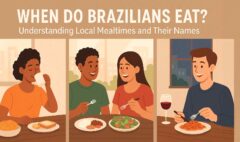Know the Right Words for Relatives in Brazilian Portuguese
Know the Right Words for Relatives in Brazilian Portuguese
Introduction
If you’re learning Brazilian Portuguese, one of the first things you’ll notice is how often people talk about their families. Family is everything in Brazil—get-togethers, holidays, even casual conversations usually involve someone’s mom, cousin, or godmother. So, if you want to sound natural and connect with people, knowing the right words for relatives is a must.
Let’s dive into the essential family vocabulary and how to use it like a native speaker.
Basic Family Vocabulary
Immediate Family Members
Here are the basics:
-
Mãe – Mom
-
Pai – Dad
-
Irmã – Sister
-
Irmão – Brother
-
Filha – Daughter
-
Filho – Son
Easy, right? These are the words you’ll use most often.
Extended Family
Let’s expand the circle:
-
Avó – Grandmother
-
Avô – Grandfather
-
Tia – Aunt
-
Tio – Uncle
-
Prima – Female cousin
-
Primo – Male cousin
-
Sogra – Mother-in-law
-
Sogro – Father-in-law
-
Genro – Son-in-law
-
Nora – Daughter-in-law
Vocabulary Table: Family Terms in Portuguese and English
| Portuguese | English |
|---|---|
| Mãe | Mother |
| Pai | Father |
| Irmã | Sister |
| Irmão | Brother |
| Filha | Daughter |
| Filho | Son |
| Avó | Grandmother |
| Avô | Grandfather |
| Tia | Aunt |
| Tio | Uncle |
| Prima | Female cousin |
| Primo | Male cousin |
| Sogra | Mother-in-law |
| Sogro | Father-in-law |
| Nora | Daughter-in-law |
| Genro | Son-in-law |
Formal vs Informal Usage
When to Use Formal Terms
In more traditional or respectful situations, people will use the full words like “meu pai” (my father) or “minha mãe” (my mother). This is common when you’re first meeting someone or talking to elders.
Informal, Affectionate Variations
In casual conversations, Brazilians love using affectionate forms:
-
Mamãe – Mommy
-
Papai – Daddy
-
Vovó – Grandma
-
Vovô – Grandpa
These add warmth and closeness to the language.
Gendered Nouns in Family Vocabulary
Masculine and Feminine Forms
Portuguese is gendered, so “a irmã” is your sister, and “o irmão” is your brother. This applies across the board:
-
Tio/Tia
-
Primo/Prima
-
Neto/Neta (Grandson/Granddaughter)
Plural Forms and Exceptions
-
Os irmãos – Siblings (can mean just brothers or mixed group)
-
As irmãs – Only sisters
Gender rules matter—get them right and you’ll sound much more fluent.
Diminutives and Nicknames
Commonly Used Diminutives
Portuguese loves diminutives:
-
Irmãozinho / Irmãzinha – Little brother/sister
-
Filhinho / Filhinha – Little son/daughter
-
Vovozinha / Vovozinho – Sweet grandma/grandpa
These are great for kids or in affectionate contexts.
Regional Nicknames for Relatives
In some parts of Brazil, people might use:
-
Painho (for dad in Bahia)
-
Mainha (for mom in the Northeast)
So charming and unique!
Describing Family Relationships
Step-Relatives and Blended Families
-
Madrasta – Stepmother
-
Padrasto – Stepfather
-
Meio-irmão / Meia-irmã – Half-brother/sister
Adoptive Relationships
-
Filho adotivo / Filha adotiva – Adopted child
-
Pais adotivos – Adoptive parents
These distinctions matter in more detailed conversations.
Possessive Phrases
Talking About “My” Mom, “Your” Uncle, etc.
-
Minha mãe – My mom
-
Seu tio – Your uncle
-
Nosso avô – Our grandfather
Examples in Real-Life Sentences
-
Minha irmã mora no Rio. – My sister lives in Rio.
-
Você viu seu primo hoje? – Did you see your cousin today?
Cultural Insights
Brazilian Family Structure
Brazilian families are usually close-knit and multigenerational. Grandparents often live with or near their children. Sundays are for family lunch. Always!
The Role of Godparents and Close Family Friends
Godparents are important and often referred to like family:
-
Madrinha – Godmother
-
Padrinho – Godfather
It’s not uncommon to call close family friends “tio” or “tia,” even if there’s no blood relation.
Practical Usage in Conversation
Asking About Someone’s Family
-
Como está sua mãe? – How’s your mom?
-
Você tem irmãos? – Do you have siblings?
Introducing Your Family Members
-
Essa é minha irmã, Ana. – This is my sister, Ana.
-
Meu pai é médico. – My dad is a doctor.
Fun Idioms and Expressions with Family Terms
Expressions Using “Mãe,” “Pai,” etc.
-
“Filhinho de papai” – Spoiled kid
-
“Casa da mãe Joana” – A chaotic, disorganized place
What They Say vs. What They Mean
These expressions can be funny, sarcastic, or affectionate. Context is everything!
Mistakes to Avoid
False Cognates and Confusing Words
Don’t mix up:
-
Prima (cousin) with “prime” in English
-
Pai (father) with “pay”
Misusing Gendered Forms
Avoid saying “meu mãe” or “minha pai.” Gender agreement is crucial.
How to Practice and Memorize Family Vocabulary
Flashcards, Apps, and Real-Life Practice
Use tools like Anki, Duolingo, or make your own flashcards.
Talking with Native Speakers
Get on language exchange apps like Tandem or HelloTalk and talk about your family!
Conclusion
Family is a cornerstone of Brazilian life and culture, and knowing how to talk about yours in Portuguese will make you sound more natural, more respectful, and more connected. Whether you’re introducing your “vovó” or chatting about your “primos,” you now have the tools to speak like a true Brazilian. Practice often, and soon it’ll all feel like second nature.
Learn Portuguese the Brazilian Way! 🇧🇷✨
At The Brazilian Ways, we believe language learning should be fun, immersive, and deeply connected to culture. Our unique courses help you speak Portuguese naturally while experiencing Brazil through its music, films, literature, and dance.
🎶 The Brazilian Music Club – Learn Portuguese through the rhythm and lyrics of Brazilian music. 🎬 The Movie Club – Improve your Portuguese while exploring the best of Brazilian cinema. 📖 The Short Story Club – Enhance your skills by diving into Brazilian literature. 💃 Portuguese for Zouk – Connect with the Zouk dance community while learning Portuguese.
✨ Join a vibrant community of learners and experience Brazil through language! 👉 Explore our programs and start today! 🚀
📲 Follow us on Instagram for more engaging content, language tips, and cultural insights: @thebrazilianways
FAQs
1. What’s the difference between “vovó” and “avó”?
“Avó” is the formal word for grandmother, while “vovó” is affectionate—like “grandma.”
2. Are there different words for family in Portugal vs. Brazil?
The core terms are the same, but pronunciation and slang can differ.
3. How do Brazilians talk about distant relatives?
Words like “parente distante” or using specific titles like “tio-avô” (great-uncle) are common.
4. Can “tio” and “tia” be used for non-relatives?
Yes! It’s common and polite to call older family friends “tio” or “tia.”
5. How do I introduce my family in Brazilian Portuguese?
Keep it simple: “Essa é minha mãe, esse é meu pai, e esses são meus irmãos.” (This is my mom, my dad, and my siblings.)













